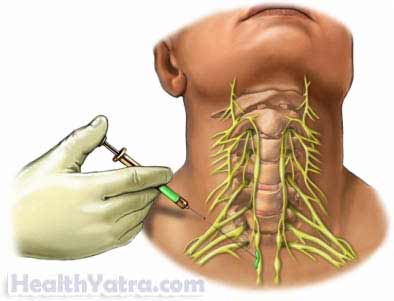Definition
Regional anesthesia is a type of anesthesia. It blocks pain to a part of the body without causing the patient to sleep.
Reasons for Procedure
Regional anesthesia is used to make the body numb for surgery:
- It may be used with high-risk surgical patients. It is safer for them than general anesthesia.
- It has been proven beneficial in trauma, operation-related pain, and short and long term medical disease and pain states.
- Epidural anesthesia is often used during childbirth to relieve labor pains.
- It has been shown to help people be mobile sooner after surgery and increases duration of pain relief.

Possible Complications
Complications are rare, but no procedure is completely free of risk. If you are planning to have anesthesia, your doctor will review a list of possible complications, which may include:
- Pain and tenderness around the injection site
- Bruising, infection, or bleeding of the injection site
- Headache
- Decrease in blood pressure
- Nerve damage
- Medicine mistakenly injected into a vein or artery
- Damage to organs
Some factors that may increase the risk of complications include:
- Current or past health problems
- Taking medicines, supplements, herbal remedies, or blood thinners
- Allergies
- Smoking
- Drinking alcohol
- Using recreational drugs
- History of adverse reactions to anesthesia
What to Expect
Prior to Procedure
Your doctor will likely do the following:
- Physical exam
- Arrange for you to meet with an anesthesiologist, who will also go over your history and do a physical examination
Leading up to your procedure:
- Fast the night before if recommended by your doctor.
- Take medicines prescribed by your doctor.
- Avoid certain medicines, if recommended by your doctor.
- Arrange to have someone drive you to and from the procedure. Also, arrange for help at home after your procedure.
Description of Procedure
With regional anesthesia, you may remain awake, but you will usually be given a sedative to help calm you. Prior to administering the anesthesia:
- Your doctor may set up monitors to track your vital signs.
- The area to be injected will be cleaned with an antiseptic solution.
- A local anesthetic may be applied to the skin or injected. This may sting slightly.
Your anesthesiologist will inject medicine near a cluster of nerves. The selected nerves will be the ones that supply the area of your body that requires surgery.
Types of regional anesthesia include epidural and spinal. Both involve injecting medicines in or near the spinal canal.
Another type of regional anesthesia, a peripheral nerve block, is often used for knee, shoulder, or arm surgery. The anesthesia is injected near clusters of nerves that feed the arms or legs. A cervical nerve block is a type of peripheral nerve block for surgeries in the neck or arm.

After Procedure
If local anesthetic is used, you will slowly gain sensation and motion again in the area that was numbed. It can take a few hours or longer before your sensation is completely back to normal. If treating for pain, the pain will return in a few hours, and the relief may take up to two weeks.
How Long Will It Take?
While the regional anesthesia procedure itself takes several minutes or longer, its effects typically last for 2-6 hours.
Will It Hurt?
Depending on whether sedation or local anesthesia is used, you may feel slight pain or tingling with the injection. The anesthetic will prevent you from feeling pain during your surgical procedure. You may feel that your limb may be heavy initially and then light later on.
Postoperative Care
Your postoperative care will depend on the nature of your surgery. Most likely, you will receive instructions about limits on your diet and activities.
Once the anesthesia wears off, sensation will return to the region where pain was blocked. You may have to restrict activities, such as driving, since you may feel numb or drowsy as your anesthetic and sedative wear off.
Call Your Doctor
After arriving home, contact your doctor if any of the following occurs:
- Signs of infection, including fever and chills
- Redness, swelling, increasing pain, or discharge from the injection site
- Tingling, numbness, or trouble moving the affected area that lasts longer than expected
- Pain that you cannot control with the medicines you have been given
- Headache
- Persistent coughing
- Shortness of breath or chest pain
- Dizziness
- Heartbeat abnormalities
- Funny taste or numbness of the mouth
- Other worrisome symptoms
In case of an emergency, call for medical help right away.
